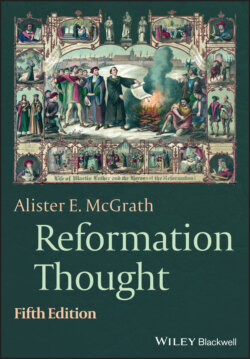Читать книгу Reformation Thought - Alister E. McGrath - Страница 13
The Lutheran Reformation
ОглавлениеThe Lutheran Reformation is particularly associated with the German territories and with the pervasive personal influence of one charismatic individual – Martin Luther (1483–1546). As we shall see, Luther was particularly concerned with the doctrine of justification by faith alone (Latin: sola fide), which became the central theme and focus of his religious thought. The Lutheran Reformation was initially an academic movement, concerned primarily with reforming the teaching of theology at the University of Wittenberg. Wittenberg was not a major university, and the reforms introduced by Luther and his colleagues within the theology faculty attracted little wider attention. It was Luther’s personal activities – such as his posting of the famous Ninety-Five Theses (October 31, 1517) and the Leipzig Disputation (June–July 1519) – which brought the reforming ideas in circulation at Wittenberg to the attention of a wider (though not always appreciative) audience.
Strictly speaking, the Lutheran Reformation really began in 1522, when Luther returned to minister in Wittenberg from his enforced protective isolation in the Wartburg castle (see pp. 98–9). Luther had been condemned by the Diet of Worms in 1521. Fearing for his life, certain well-placed supporters removed him in secrecy to the castle known as the “Wartburg” until the threat to his safety had passed. (Luther used his enforced isolation to begin translating the New Testament into German.) In his absence, Andreas Karlstadt (1486–1541), one of Luther’s academic colleagues at Wittenberg, began a program of reform at Wittenberg which threatened to degenerate into chaos. Convinced that his own presence was needed if the Reformation was to survive Karlstadt’s ineptitude, Luther emerged from his place of safety, and returned to Wittenberg.
At this point, Luther’s program for academic reform changed into a wider program for the reform of German church and society. No longer was Luther’s forum of activity the university world of ideas – he now found himself regarded as the leader of a religious, social, and political reforming movement which seemed to some contemporary observers to open the way to a new social and religious order in Europe.
In fact, Luther’s program of reform was actually more conservative than that associated with his Reformed colleagues, such as Huldrych Zwingli. It also met with rather less success than some anticipated. The movement remained obstinately landlocked within the German territories, and – the kingdoms of Scandinavia apart – never gained the foreign power-bases which had seemed to be, like so many ripe apples, ready to fall into its lap. Luther’s understanding of the role of the “godly prince” (which effectively ensured that the monarch had control of the church) does not seem to have held the attraction that might have been expected, particularly in the light of the generally republican sentiments of Reformed thinkers such as Calvin. The case of England is particularly illuminating: here, as in the Lowlands, the Protestant theology which eventually gained the ascendancy was Reformed rather than Lutheran, despite early interest in Luther’s distinctive ideas.
